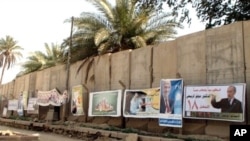A top Iraqi official says the country's election is off to a good start, even before almost 20 million Iraqis head to the polls for Sunday's crucial vote.
The head of Iraq's Independent High Election Commission, Farij al-Haydari, said Saturday that the country's early voting was, in his words, "done smoothly and without any obstacles."
Nearly a million Iraqis were eligible to cast early votes Thursday - including soldiers, police, medical staff, patients and prisoners. Officials say counting of those ballots is now under way.
The second-ranking U.S. military officer in Iraq, Lieutenant General Charles Jacoby, told reporters Saturday that security for the elections is, in his words, "an all Iraq show." He said the Iraqis have shown they have the capacity to run a safe, legitimate election on their own.
Millions of Iraqis living overseas in 14 countries began voting Friday.
Most Iraqis will vote Sunday, choosing from more than 6,000 candidates for the country's 325-seat parliament.
There are no clear frontrunners, and private polling data is considered unreliable. Many voters likely will choose among the three major Shi'ite led coalitions.
Iraqi Prime Minister Nouri al-Maliki's State of Law Coalition and former Prime Minister Ayad Allawi's Iraqiya bloc have both reached out to Sunnis and other minority groups.
A third Shi'ite coalition, the Iraqi National Alliance, has been playing up its sectarian profile and has strong ties to Iran. It has been getting support from followers of anti-American cleric Moqtada al-Sadr.
Political observers say several smaller blocs could end up playing key roles in the formation of a new government.
The vote is only the second parliamentary election in Iraq since the U.S.-led invasion that ousted Saddam Hussein in 2003. It is being monitored by the United Nations, the Arab League and various international groups, as well as some 200,000 Iraqis.
Unlike the previous national election in 2005 when Iraqi Sunnis boycotted the polls, many of them say they plan to participate. Many Iraqi politicians also have been running campaigns that attempt to cut across sectarian lines.
Some information for this report was provided by Reuters.




